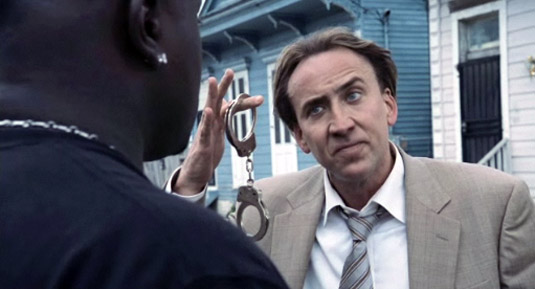
Director Werner Herzog has remade a tale – the 1992 Abel Ferrara micro-cult indie cop drama Bad Lieutenant starring Harvey Keitel – that never warranted a revisit. The result is Bad Lieutenant: Port of Call New Orleans, starring Nicolas Cage as an imbalanced corrupt cop with more vices than a carpenter’s woodshop and a paranoid fear of iguanas. Apparently the only similarities between the two films are the title and the presentation of an immoral drug addict. In grand idiosyncratic fashion, Herzog reportedly commanded Cage on the set to “turn the pig loose!” Herzog told the Toronto Star: “He immediately knew what I meant. And man, does he turn the pig loose! As an actor, he always understood the fluidity of the situation. The kind of musicality, jazz in particular, which allows you to improvise and stay within a certain mood and go wild.”
In the past decade, Cage has been a victim of disparagement and derision from audiences for his schlocky acting roles. The Wicker Man, Ghost Rider, Next, Bangkok Dangerous, Knowing. The worse the film, the wackier his stylized coif.
While reviews for Lieutenant are on-the-whole very positive, critics are either praising Cage’s Frank Booth-esque tour-of-force of mayhem or dismissing his ability to act at all. Regardless, his portrayal of Terence McDonagh qualifies as his most challenging role since his 1996 Oscar-winning turn in Leaving Las Vegas.
More after the jump.
Cole Smithey writes that Cage loses control of the character, slipping into an “off-putting vocal delivery late in the story,” which further distracts from the patchwork plot. “Cage even goes so far as to tear a page from Klaus Kinski's relationship with the camera,” he says, “but the tribute is as inappropriate as making a sequel to a film to which there could never be a follow-up. A disaster.”
Roger Ebert, who swam against the current in awarding Cage’s film Knowing four stars in March, comes to the actor’s defense. He argues that Cage and Herzog, “both made restless by caution,” were born to work together and gives this film four stars as well. “No one is better at this kind of performance than Nicolas Cage. He's a fearless actor. He doesn't care if you think he goes over the top. If a film calls for it, he will crawl to the top hand over hand with bleeding fingernails.”
Andy Klein of Brand X breaks the opposing camps down into how they’ll perceive this film. “Cage’s affectations are always daring, if not always successful. His contorted posture rightfully reminds us that he is always one inch away from excruciating back pain, but a shift in his manner of speaking for several scenes around the three-quarter mark is simply baffling. Your reaction to the whole thing probably depends on your general feelings about Cage: Fans will relish his unique brand of scenery-chewing; non-fans are likely to be irritated.”












